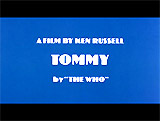
|
Tommy (1975, UK)
In writer/producer/director Ken Russell's
extravagant and excessive British rock-musical cult film Tommy (1975) -
the sensually-assaultive musical fantasy drama presented The Who's (and
Peter Townshend) 1969 rock opera (the group's 4th album) about a deaf,
dumb, and blind kid who sure played a 'mean pinball" and went on to become
a spiritual cult leader. The rock band The Who performed their rock opera Tommy at
the Metropolitan Opera House in New York City on June 7, 1970, and became
the first act to play rock music there.
The many themes of director Russell's visually-striking
spiritual parable (told in sound and music) were dysfunctional families
(exhibiting rampant parental neglect and child molestation and abuse),
the emptiness of organized religious cults, and the addictive nature
of pop fame and spirituality. The film's two main taglines were:
"Tommy - He Will Tear Your Soul Apart,"
and "Your senses will never be the same." Recurring symbols, motifs
or images included spheres (or globes), Freudian phallic references,
and religious iconography (statues).
The independent film was produced by director Russell and entertainment
tycoon Robert Stigwood, who was behind some of the greatest musical-films
ever produced, including Jesus Christ Superstar, Saturday Night
Fever (1977) and Grease (1978),
and also some of the biggest Broadway stage hits, including Hair,
Oh, Calcutta!, Jesus Christ Superstar, Evita, and Sweeney Todd:
The Demon Barber of Fleet Street.
The experimental, controversial, fearless and sensational
Russell had established a reputation for himself as an extravagant,
visionary and excessive British film maker in the 1970s, with these
films already in his repertoire and a few more to come. Tommy was
his first commercial hit film:
- Women in Love (1969), an adaptation of D.H.
Lawrence's novel
- The Music Lovers (1971), about the life
of Russian composer Tchaikovsky
- The Devils (1971), a shockingly-controversial film about
demonic possession, with Vanessa Redgrave and Oliver Reed
- The Boy Friend (1971), a tribute to Busby
Berkeley's Hollywood musicals, starring Twiggy
- Tommy (1975), a hyper-wild visualization of
Peter Townsend's rock opera
- Lisztomania (1975), a depiction of Franz
Liszt as a sex-obsessed rock star
- Valentino (1977), another screen biography - this time of
a silent screen idol (Rudolf Valentino) with
dancer Nureyev in his debut film role, opposite Michelle Phillips
On a budget of $5 million, the dazzling film grossed
a whopping $34.3 million (worldwide). It was nominated for two Academy
Awards: Best Actress (Ann-Margret), and Best Music - Original Song
Score or Adaptation (Pete Townshend).
- in the film's prologue presented as a montage, in
the year 1945, after his marriage to his fiancee Nora (Ann-Margret)
and their honeymoon in the mountains, British Group Captain Walker
(Robert Powell) went on a WWII flying mission as an RAF bomber
pilot, but went missing in action, and he was feared dead [Note: He actually had survived
- but was badly-burned after being shot down; meanwhile,
newlywed wife Nora gave birth to a son named Tommy Walker (Barry
Winch as young Tommy) on V-E Day (Victory-in-Europe)
- in the intervening five years, Tommy's mother Nora
entered into a relationship with the brutish Frank Hobbs (Oliver
Reed), a camp counselor at "Bernie's Holiday Camp" that Tommy attended;
Frank and Nora married, and he was thereafter regarded as Tommy's
"Uncle" or step-father
- in 1951 (on a stormy New Year's Eve), the recovered
Captain Walker returned home to find Nora having sex with her new
lover Frank in bed; during a struggle thinking that the intruder
was a burglar, Frank killed the Captain; Tommy saw his father's
silhouette and had followed it into the bedroom, where he witnessed
the murder (in a mirror reflection that somehow captured both Captain
Walker's and Tommy's souls); the impressionable young boy was traumatized
by everything, and both Frank and Nora coerced Tommy to remain
completely blank and silent:
- "You didn't hear it, You didn't see it, You won't say nothin'
to no one, Ever in your life, You never heard it, How absurd
it all seems, Without any proof."
- due to the pressures put upon him, Tommy took them
literally and retreated into his own inner world, suffering from
a dissociative disorder; he became catatonic and was literally
"deaf, dumb and blind"; however, he did retain his sense of
touch and was still able to imaginatively perceive and intuit the
world around him, but with an altered state of consciousness; he
frequently spent hours looking into the mirror, fantasizing that
he was someone else who had his hearing, speech, and vision intact
- as the increasingly-isolated Tommy (Roger Daltry
as grown-up) grew up over the next decade and a half, his frustrated,
guilt-ridden mother and Frank tried to cure and heal him with various
forms of adult escapism, first with religious instruction; he visited
with a faith healing Preacher (Eric Clapton) - the head of a Marilyn-Monroe
cult
- Tommy was also sent to a drug-addicted
prostitute known as the 'Acid Queen' (singer Tina Turner in her
film debut) assisted by two hand-maidens (Juliet and Gillian King);
she advertised herself as able to cure ailments with hard drugs: "I'm
guaranteed, To tear your soul apart!"; she also sang: "Give us
a room, Close the door, Leave us for a while, You won't be a boy
no more...," as she was about to inject LSD with dozens of needles
into Tommy, but they had little effect
- the guardian-couple also began to neglect their
son, relinquishing his care to their relative - sado-masochistic
punk biker Cousin Kevin (Paul Nicholas) who tortured and raped
him, singing:
- "How would you feel if I turned on the bath,
Ducked your head under and started to laugh? Maybe a cigarette
burn, On your arm, Would change your expression, to one of
alarm. I'm the school bully! The classroom cheat!
The nastiest play friend you ever could meet! I'll put glass
in your dinner, And spikes in your seat! I'll drag you around
by a lock of your hair! And give you a push at the top of the
stairs!...I'm the school bully, The classroom cheat, The nastiest play
friend you ever could meet! I'll stick
pins in your fingers, and tread on your feet! We're on our own,
Cousin. All alone, Cousin! We've thought of some nice games to
play, While the grownups has all gone away!..."
- Tommy was also abused and molested by Frank's friend
- the equally-sexually tormenting pimp 'Uncle' Ernie (Keith Moon,
one of the members of The Who), even though Nora knew that Ernie
was problematic: "Do you think it's alright, To leave the boy
with Uncle Ernie? Do you think it's alright? He's had a few too
many tonight, Do you think it's alright?"; after Frank and Nora
left Tommy with Ernie, their fears about his treatment of Tommy
were realized, when Ernie admitted:
- "Your mother left me here, To mind you, And
I'm doing exactly, What I bleedin' well want to, Fiddling about,
fiddling about, Fiddle about, Down with your bedclothes, Up
with your nightshirt..."
- one night as Tommy was left interminably staring
into his mirror, he envisioned wandering into a junkyard and playing
a pinball machine; remarkably, he was able to play and was judged
to be a skilled prodigy by Frank, who realized that Tommy could
be exploited for fame and money
- in the pulsating production number "The Pinball
Wizard" during preparations for a pinball championship tournament, the current
champion - cocky Pinball Wizard (Elton John) who wore tall skyscraper Doc Martens shoes
and glittering eye-glass goggles, sang about his threatening competitor;
he worried about how Tommy played "a mean pinball" using
his sense of smell and his intuition:
- "Ever since I was a young boy, I played the
silver ball, From Soho down to Brighton, I must have played
them all, But I ain't seen nothin' like him, In any amusement
hall, That deaf, dumb and blind kid, Sure plays a mean pinball....Well,
he ain't got no distractions, Can't hear no buzzers and bells,
Don't see lights a-flashing, He plays by sense of smell, Always
has a replay, Never tilts at all, That deaf, dumb and blind
kid, Sure plays a mean pinball!"
- Tommy was able to defeat the current champion,
but basically still remained comatose
- in her stark white bedroom, Tommy's
troubled, guilt-ridden mother Nora sang the song "Champagne" (to
celebrate her son's victory - and to revel in her fabulous fame
and luxurious wealth, furs, clothes, etc)
- "Today it rains champagne! A son was born again!
A genius untamed! A life of wealth and fame, wealth and fame!
Champagne flowing down just like rain, Caviar breakfasts every
day, Merchant banks and yachts at Cannes, Servants and cars
and private sand....They flock in, thousands strong. We'll
just play along. A million in reserve. For love, a just deserve,
just deserve! Francs and dollars and peacock's
wings, Sequined gowns and birds that sing! Private planes and
fishing lakes. Bigger crowds and bigger, bigger, bigger takes.
But what's it all worth? What's it all worth when my son is
blind? He can't hear the music nor enjoy what I'm buying. His
life is worthless, affecting mine. I'd pay any price to drive
his plight from my mind!"
- she was watching TV with a remote control, but couldn't
flip through the channels fast enough to avoid seeing her son pleading
with her: "See
me, feel me. Touch me, heal me"; in the sequence popularly known
as the infamous "beans sequence," mock TV commercials played
on the TV for Rex Baked Beans, Black Beauty chocolates, and HI
power low suds; she tried to douse her self-hatred
with liberal gulps of champagne, but suffered an extreme
mental breakdown; she tossed the champagne bottle at her television
set, causing it to explode and vomit the sexualized, advertised
products onto her body, covering her with a gooey, sudsy, and messy
mixture
- an attempt was made to find a medical specialist
- Dr. A. Quackson (Jack Nicholson), to treat and cure Tommy for
his psychological and emotional psycho-somatic condition; the doctor
sang to Nora about the difficulty of finding a solution:
- "There is no chance, no untried operation. All
hope lies with him and none with me. Imagine though the shock
from isolation, when he suddenly can hear and speak and see!...His
eyes can see, his ears can hear, his lips speak. All the time
the needles flick and rock. No machine can give the kind of
stimulation, Needed to remove his inner block"
- out of frustration in her bedroom, the hysterical,
hair-flipping Nora - after crazily dashing around and singing "Smash
the Mirror,"
'accidentally' threw Tommy into the spherical mirror, and he landed
on the other side of the mirror in a pool, freed from his psycho-somatic
prison; Tommy was miraculously restored, electrified, healed and
jolted from his mental block and his soul was released; he realized
that his fantasy world within the mirror world was the same as
the outer real-world; he was transformed and regained full consciousness;
after his literal breakthrough, he sang lyrics from "I'm
Free" to express his vision of how he would now be able to enlighten
others:
- "I'm free, I'm free, And freedom, Tastes of reality, I'm free,
I'm free, And I'm waiting, For you to follow me."
- as a result of his experience and pinball fame,
Tommy decided to transform the world by becoming the Messianic
leader of a religious movement with fervent followers worldwide
seeking enlightenment of their own lost souls; by the mid-1970s,
he traveled on lecture tours and led odd gospel-like shows, leading
to many converts and the creation of a "holiday camp" (run by his
family and abusive "Uncle" Ernie)
- at the camp, the boy wonder Tommy sang to his
followers about abstaining from alcohol and drugs, and instead
to take up pinball, and become deaf, mute, and blind, in order
to recreate and emulate his own childhood and to follow on his
exact path toward a revelatory conversion:
- "My name is Tommy, And I became aware this
year, If you want to follow me, You've got to play pinball,
And put in your earplugs, Put on your eyeshades, You know where
to put the cork"
- Tommy's confused and angry converts and hero-worshippers
rebelled and expressed their distrust of Tommy's mock religious teachings;
they complained about the pricey, crass commercialization (T-shirts, record albums, and religious
artifacts) promoted by Tommy's relatives, and refused to obey
his tough demands and restrictions; they rejected his antidote to not trust their own eyes or ears just
as his mother had instructed him years earlier; they were looking
for an emotional-salvation experience rather than trivial existential
solutions:
- "These pricey deals don't teach us,
Your freedom doesn't reach us, Enlightenment escapes us,
Awareness doesn't shape us, How can all this trivia, Take
us to the goal you reached?"
- a riot developed that led to the murder of both
Frank and Nora; the fiery destruction of the camp left
Tommy's parents burned in the debris; devastated by their loss, Tommy
mourned their deaths and fled to the highest peak of mountains
where his parents had celebrated their honeymoon, and watched the
rising sun
|

The Acid Queen (Tina Turner)
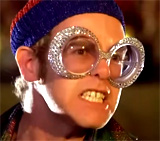
Pinball Wizard (Elton John)
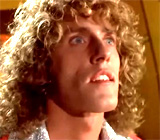
Tommy (Roger Daltry)
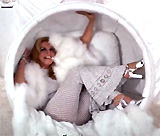
Nora's Performance of the Song: "Champagne"
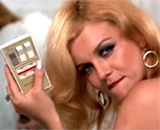
Nora With the TV Remote
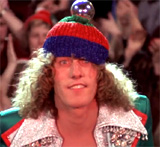
Tommy Pleading with Her in Her Mind: "See me, feel me. Touch me, heal me"
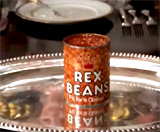
TV Commercials For Rex Baked Beans ("Fit For a Queen")
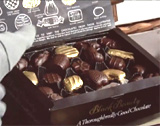
For Black Beauty Chocolates
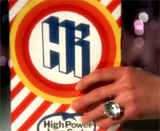
For HI Power Low Suds - Laundry Detergent
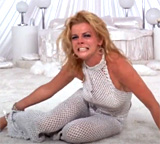
"What's it all worth when my son is blind?"
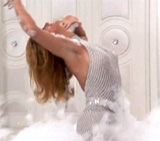
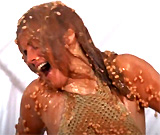
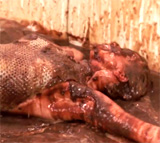
Exploding Television - With Soap Suds, Baked Beans, Chocolate
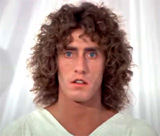
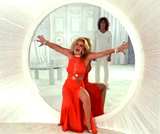
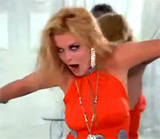
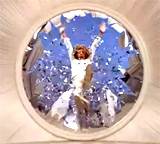
"Smash the Mirror" - Nora 'Accidentally' Threw Son Tommy Through the
Mirror in Her Bedroom
|


















